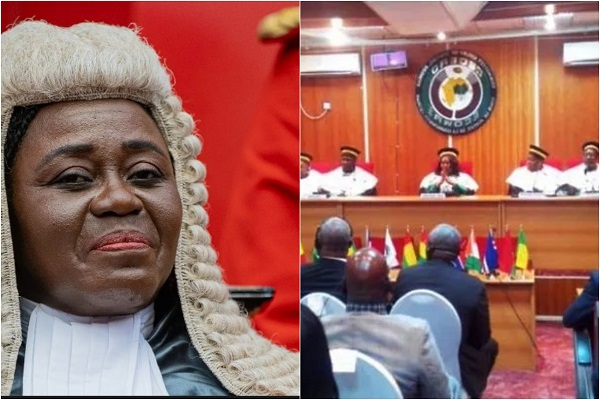as ECOWAS Court Dismisses Bid for Interim Relief
By TNR News Desk
Former Chief Justice Gertrude Araba Esaaba Sackey Torkonoo has endured another setback in her legal battles as the ECOWAS Court of Justice dismissed her application for interim measures. This decision compounds her ongoing challenges against her suspension and removal from office.
The ruling, delivered on the morning of November 19, 2025, by the ECOWAS Court, underscores Torkonoo’s growing list of unsuccessful attempts to secure temporary relief while her substantive cases progress through various courts in Ghana and the region. Deputy Attorney-General and Minister for Justice, Dr. Justice Srem Sai, confirmed the ruling and stated that the Court found the application lacked both urgency and legal merit.
Dr. Srem Sai reported that the Court emphasized Torkonoo’s failure to demonstrate any imminent or irreparable harm, a crucial requirement for granting interim measures. The ruling highlighted the Court’s assertion that “the application did not satisfy the criteria for a grant of interim measures.”
In dismissing the application, the Court noted the inconsistency between Torkonoo’s claims of imminent danger and her own conduct, stating that her actions did not support her assertions of urgency. The justices concluded that the nearly three-month delay in filing the application undermined her arguments, as the absence of urgency rendered further examination of her claims unnecessary.
Torkonoo’s latest legal hurdle is part of a broader and intricate challenge against the Republic, originating from her suspension and removal by President John Dramani Mahama earlier this year. Her removal was prompted by recommendations from an Article 146 Committee of Inquiry, led by Justice Gabriel Pwamang Scott, which examined allegations against her.
In July, Torkonoo lodged her challenge with the ECOWAS Court, alleging unconstitutional actions by the government and violations of her fundamental human rights. This case in Abuja runs concurrently with multiple lawsuits she has initiated within Ghana’s judicial system, showcasing her aggressive multi-jurisdictional approach.
However, these parallel legal strategies have yielded little in terms of favorable outcomes. Various applications for injunctions and provisional measures connected to her dispute have been dismissed by both the Supreme and High Courts in Ghana. Monday’s ruling from the ECOWAS Court further compounds her series of interim setbacks.
While interim measures can offer temporary protection in human rights cases before the ECOWAS Court, the tribunal maintains high standards for urgency and puts great emphasis on showing irreparable harm. By its assessment, Torkonoo’s application fell short of these stringent criteria.
As the substantive cases unfold both domestically and regionally, they will play a critical role in shaping the ongoing discourse surrounding judicial accountability, constitutional safeguards, and the delicate balance of powers in Ghana. For now, the former Chief Justice confronts yet another legal obstacle, reflecting the steep and challenging path in her quest to overturn the decisions that led to her removal from the bench.


